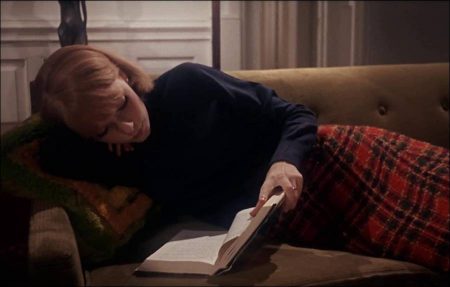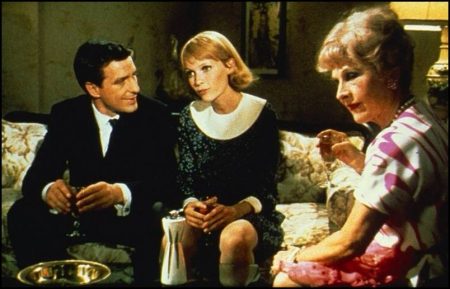Rosemary’s Baby movie storyline. Desirous of starting a family, the young Catholic housewife Rosemary Woodhouse and her struggling actor husband Guy move into the Bramford: an iconic New York’s building that brims with unpleasant stories of obscure dwellers and ghastly occurrences. Before long, the young couple is befriended by their somehow eccentric next-door neighbors Roman and Minnie Castevet and, shortly after, Rosemary gets pregnant.
However, little by little–as the inexperienced mother becomes systematically cut off from her circle and friends–alarming hints of a sinister and well-planned conspiracy begin to emerge, enfolding the timid Rosemary in a shroud of suspicion and mental agony. In the end, why is everyone so conveniently eager to help; furthermore, why is Guy allowing it?
Rosemary’s Baby is a 1968 American horror film written and directed by Roman Polanski, based on the novel Rosemary’s Baby by Ira Levin. The cast features Mia Farrow, John Cassavetes, Ruth Gordon, Sidney Blackmer, Maurice Evans, Ralph Bellamy, Angela Dorian, Clay Tanner, and, in his feature film debut, Charles Grodin. The film chronicles the story of a pregnant woman who suspects that an evil cult wants to take her baby for use in their rituals.
Rosemary’s Baby deals with themes related to paranoia, women’s liberation, Christianity (Catholicism), and the occult. The film earned almost universal acclaim from film critics and won numerous nominations and awards. In 2014, the film was selected for preservation in the National Film Registry by the Library of Congress, being deemed “culturally, historically, or aesthetically significant.”
About the Story
In 1965, Guy and Rosemary Woodhouse are being shown a recently vacated apartment in the Bramford, a large Gothic-like building in New York City. The previous tenant, an elderly woman, fell into a coma and died. After noticing that a large highboy dresser is blocking the hallway closet, they move it. Inside there is only a vacuum cleaner, towels, and some removed shelving.
Guy and Rosemary move in, ignoring their friend Hutch’s warning about the Bramford’s dark past involving witchcraft and murder. Later, Rosemary meets a young woman, Terry Gionoffrio, a recovering drug addict who Minnie and Roman Castevet, the Woodhouses’ elderly new neighbors, took in from the street. Rosemary admires a pendant necklace the Castevets gave to Terry but dislikes the content’s pungent odor. One night, Terry apparently jumps to her death from the Castevets’ seventh-floor apartment.
The couple are befriended by the Castevets, who Rosemary finds annoying and meddlesome, though Guy grows increasingly attached. Minnie gives Terry’s pendant to Rosemary, saying it is a good luck charm containing “tannis root”. Soon after, Guy lands an important role in a play after the original actor inexplicably goes blind. With his career on track, Guy wants them to have a baby.

On the night Guy and Rosemary plan to conceive, Minnie brings them individual cups of chocolate mousse. Guy chastises Rosemary for complaining hers has a chalky “under-taste”. She only eats a small portion before secretly dumping out the rest. She passes out and experiences a dreamlike vision in which a demonic presence is raping her as Guy, the Castevets, and other Bramford tenants, all nude, are watching. The following morning, Rosemary’s body is covered in scratches. Guy says they had sex while she was unconscious, not wanting to miss “baby night”. Rosemary, irritated, insists they could have waited a day.
When Rosemary becomes pregnant, the Castevets insist she go to their close friend, Dr. Abraham Sapirstein, a prominent obstetrician, rather than her own physician, Dr. Hill. During her first trimester, Rosemary suffers severe abdominal pains and loses weight, though Dr. Sapirstein attributes it to temporary stiff pelvic joints. Her gaunt appearance alarms Hutch, who later researches the Bramford’s history and Roman Castavet.
The night before Hutch is to meet with Rosemary to share his findings, he falls into a mysterious coma. Rosemary, unable to withstand the pain, says she is going to go see Dr. Hill, angering Guy who is concerned about offending Dr. Sapirstein. As they argue, the pains suddenly stop. Rosemary feels the baby move for the first time, though Guy nervously jerks his hand away from her abdomen.
Three months later, Hutch’s friend, Grace Cardiff, calls Rosemary to say he passed away. Before dying, he briefly regained consciousness, directing Grace to give Rosemary a book about witchcraft along with the cryptic message: “The name is an anagram”. Rosemary studies the book and deduces that Roman Castevet is an anagram for Steven Marcato, the son of a former Bramford resident and a suspected Satanist. She suspects the Castevets and Dr. Sapirstein belong to a Satanic coven and have sinister designs for her baby. Guy discounts her suspicions and throws the book away, leading her to believe he may be involved.
Rosemary, terrified, goes to Dr. Hill for help. Assuming she is delusional, he calls Dr. Sapirstein, who arrives with Guy to take Rosemary home. They assure her that neither she nor the baby will be harmed. Rosemary locks herself into the apartment, but coven members infiltrate and restrain her. Dr. Sapirstein sedates an hysterical Rosemary, who goes into labor and gives birth. When she awakens, she is told the baby died. As Rosemary recovers, she hears an infant crying that Guy claims belongs to new tenants.
Rosemary’s Baby (1968)
Directed by: Roman Polanski
Starring: Mia Farrow, John Cassavetes, Ruth Gordon, Hope Summers, Sidney Blackmer, Maurice Evans, Ralph Bellamy, Hanna Landy, Emmaline Henry, Elisha Cook Jr., Victoria Vetri, Patsy Kelly
Screenplay by: Roman Polanski
Production Design by: Richard Sylbert
Cinematography by: William A. Fraker
Film Editing by: Sam O’Steen, Bob Wyman
Costume Design by: Anthea Sylbert
Set Decoration by: George R. Nelson
Art Direction by: Joel Schiller
Music by: Krzysztof Komeda
MPAA Rating: None.
Distributed by: Paramount Pictures
Release Date: June 12, 1968
Views: 275


